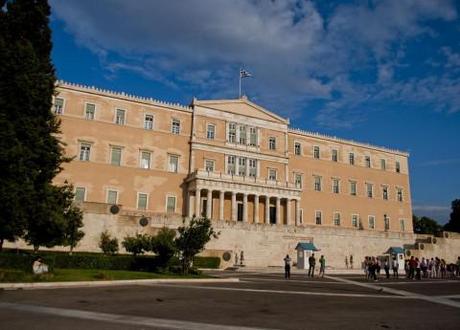 Greek Parliament: Greeks narrowly handed the June 17 election to New Democracy. Now what?
Greek Parliament: Greeks narrowly handed the June 17 election to New Democracy. Now what?
The background
Greece avoided “Drachmageddon” on Sunday when voters handed a very narrow victory to the centre-right New Democracy party, a party that supports Greece staying in the euro.
While headlines are proclaiming the vote a win for austerity, it was only just: Though the anti-austerity leftists, SYRIZA, conceded the election, they lost by only about 3 percent of the vote. Greek President Karolas Papoulias will now ask the leader of New Democracy, Antonis Samaris, to form a coalition government – a task Greek legislators were unable to accomplish six weeks ago, after the first round of Greek elections.
Germany failed to conquer Europe militarily – is it now try to economically? Check out Prince Pavlos of Greece’s Agora debates on Periscope.
Markets opened positively Monday morning, but relief at the euro’s reprieve soon dissipated, as Spain’s borrowing costs again pushed the 7 percent barrier, a level seen by many as ruinously high. And, Joshua Chafflin noted at the Financial Times, the prospect of protracted coalition talks followed by “nail-biting” negotiations with Greece’s lenders “will bring more of the uncertainty that has roiled financial markets in recent weeks.” Unsurprisingly, most major indexes by midmorning were down from close on Friday, The New York Times reported. Meanwhile, G20 members meet in Mexico and it’s likely that the euro situation will be a major topic of discussion.
Political horsetrading to begin in Greece
New Democracy received only around 29.66 percent of the vote, while the left-wing, anti-austerity SYRIZA took 26.88 percent of the vote. In terms of seats in Parliament, that, Greek newspaper Ekatherimini reported, means 129 for New Democracy and 71 for SYRIZA; the remainder sees 33 for PASOK, 20 for Independent Greeks, 18 for Golden Dawn, 17 for Democratic Left and 12 for the Communist Party. So to whom will New Democracy turn first? Good question. SYRIZA has made it clear that it won’t consider a coalition; a New Democracy-PASOK-Democratic Left government would have 179 seats, but PASOK has also indicated that it won’t be part of any coalition without SYRIZA. Expect intense political horsetrading, followed by more negotiations with international lenders over the terms of the loans keeping Greece afloat.
Greece expects Brussels to sort it out for them
Media boiled down the election to a pro versus anti-austerity contest, a simplification that Conservative MP and Telegraph writer Daniel Hannan says is inappropriate as “a glance at the party manifestoes reveals that they are all, in varying degrees, anti-austerity.” That made for an election in which “[a]ll the main parties duly parroted what voters wanted to hear”, and fueled the Greek electorate’s denial: “It rejects austerity, but insists on keeping the euro.” For 30 years, he said, Greece has been indulged by Brussels and “Now, faced with what they see as a problem of the EU’s making, Greeks understandably shrug their shoulders and expect Brussels to sort things out for them.”
Greece is the victim
The Greek elections were yet another opportunity to examine the failings of the debt-burdened nation, but, economist Paul Krugman claimed at The New York Times, “those failings aren’t what caused the crisis that is tearing Greece apart”. Krugman continued, “No, the origins of this disaster lie farther north, in Brussels, Frankfurt and Berlin, where officials created a deeply — perhaps fatally — flawed monetary system, then compounded the problems of that system by substituting moralizing for analysis. And the solution to the crisis, if there is one, will have to come from the same places.”
This European crisis will take more than bailouts to solve
Greece’s election results were markedly similar to those in May, which sparked a period of intense instability and fear as the parties scrambled unsuccessfully to form a coalition government. But wrote John Kampfner in The Independent, unfortunate as that is, it won’t really impact the “longer-term historical cycle”, “for what we are watching is the inexorable, albeit now-accelerated, decline of a political bloc wedded to two competing economic orthodoxies, each as self-indulgent as the other.” In one corner, the free market supporters and their “dogged refusal to factor in broad consequences for their actions”; in the other, “myopic advocates of the high-tax, high-subsidy model, based around 20th-century notions of a bloated public sector and unsustainable welfare.” Both are to blame for this European crisis, that “[i]t will take far more than bailouts and exhortations to voters to solve.”

